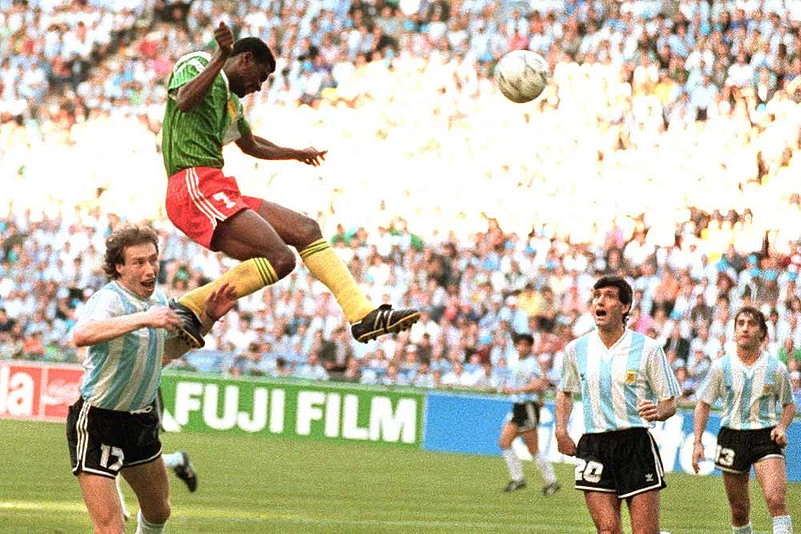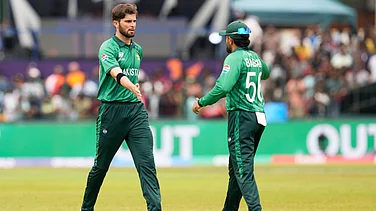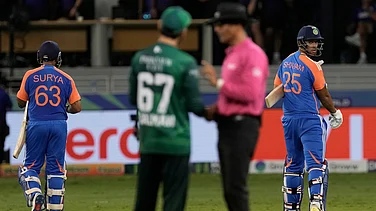It is often claimed that football is more than just a sport. It can play an important societal role as a vehicle for expressing identity and can act as a means of achieving unity and reconciliation among disparate people. There are few contexts in which this is truer than Africa, where the sport, at various different levels, has proved to be a hugely influential tool. Ivorian writer Veronique Tadjo references the importance of “the images that carpet the unconscious mind of a whole nation” and in Africa, where national identity can be a fragile concept, football provides a vivid expression of belonging and attachment. Football was brought to Africa in the late 19th century, an import of the western sailors arriving in the port cities of the exterior. During the colonial period, sport increasingly acted as a platform for the expression of, as Paul Darby put it, “indigenous aspirations for emancipation and harnessing resentment” towards the attitudes of the West. In the nations of Africa, where frontiers were often created arbitrarily, and with little consideration for demographics or history, football has proved to be an effective vehicle for uniting people beneath the ‘banner’ of a single nation.
Take, for example, Nigeria, a land forged by the British, and containing a multitude of sub-national identities, languages and cultures. Considering the contemporary country and its fractured, fluid identity, African expert Richard Dowden suggests that ‘Nigerian-ness’ exists nowhere apart from when the national side, the Super Eagles, are playing.
The teams are, therefore, a cornerstone of national identity. Wiebe Boer considers football to be “an immensely important national phenomenon, unifying force, and contributor to Nigeria’s integration into the international community”. Even as recently as 2011, when South Sudan emerged as the world’s newest nation, Kathryn Westcott of the BBC acknowledged that football may well prove, once again, to be a key method of forging a notion of nationhood. Football achieves this by providing unity through a common culture, thus furnishing the fragile nation states of Africa with the cultural content of the nation. Indeed, soccer is now so rooted in urban African culture that in the words of Peter Alegi, “it provided a rare form of ‘national culture’ in post-colonial Africa”.
Football emerges as a crucial component of the process through which people associate with others and form their own identity. Post-independence, the sport was seized upon by many national leaders who noticed the ‘socialising powers’ of the sport and sought to use it to accrue support through the dissemination of symbols of the state and the nation.
There are numerous examples, across Africa and within the continent’s history, of presidents using the sport to achieve specific nationalistic goals. Nnamdi Azikiwe, Nigeria’s founding father, was keen to use the sport to an African end, rather than a colonial one, and established his own football club—Zik’s Athletic Club—to act as a symbol of his commitment to pan-ethnic African nationalism. The project brought together distant places and disparate people to fuel the construction of a frail sense of nationhood. The zac gave body to the imagined community that would become Nigeria.
A decade later, in North Africa, the Algerian National Liberation Front formed a ‘national’ team to act as a symbol of anticolonial resistance against the French and to raise international awareness of Algeria’s predicament. As explored by Mike Cronin, the Algerian nation, before it had even come into existence, was made real for the duration of a match by eleven men “in national uniform, standing under a national flag, singing an anthem and competing as a recognised nation”.

Afriyie Acquah, one of Ghana’s exciting new talents. (Photograph by Reuters, From Outlook 23 June 2014)
Even today, half a decade after the beginning of the end of colonialism in Africa, football still plays an important role in the establishment of nationhood. During the Ivorian Civil War, the unifying potential of the national side, Les Elephants, was evident. Whilst the country was divided on religious and ethnic lines, with questions being asked about the true nature of ‘Ivoirite’, football was the sole thing that still managed to unite Ivorians. The national side even managed to encourage reconciliation during the recent conflict by expressing their ethnic neutrality and their commitment to a united nation.
Beyond the context of the team, individual African players can also take on major roles within their respective countries and within the national consciousness. Men like Samuel Eto’o (Cameroon), Didier Drogba (Cote d’Ivoire) and Mohamed Aboutrika (Egypt) are revered to almost godlike levels within their respective nations, while George Weah, one of Africa’s greats and Liberia’s finest-ever player, brought his typically Liberian qualities of independence, individuality and invention to the political sphere when he ran for president in 2005.
Africa’s World Cup history is a tale of breathless highs and desperate lows. For the first eight years, only Egypt, who featured in 1934, represented the continent. The 1970s and 1980s were dominated by North African nations. Zaire, who endured a disastrous maiden campaign in 1974, was sub-Saharan Africa’s only representatives before Cameroon, taking advantage of a second allocated place for the continent’s sides, made its debut in 1982.
This was the year when Algeria, driven forward by the superb Rabah Madjer and Lakhdar Belloumi, secured a 2-1 win over then Euro champions West Germany in Gijon, Spain. The triumph is remembered as one of Africa’s greatest hours on the world stage but due to a conspiracy between West Germany and Austria, the Desert Foxes were eliminated in the first round.
It was the Indomitable Lions of Cameroon who delivered one of Africa’s first fairytale showings in the 1990 World Cup in Italy. Driven forward by the ageless veteran Roger Milla, the central Africans defeated holders Argentina in the opening match—a result which remains, to this day, one of the greatest shocks in the history of the competition—before bowing out to England in a tempestuous quarter-final.
This magnificent showing changed the perception of Africa within the world game and opened the door for a third continental representative. There was a genuine expectation that Cameroon’s pioneering outing was a sign of things to come for the continent. Pele, one of the finest players the game has ever known, even went as far as to suggest that an African nation would win the competition before the year 2000.
The wait goes on, and, in light of such early optimism, it’s hard not to lament the lack of tangible progress made by the continent’s teams within the context of the global spectacle. Despite having their World Cup allocation increased to five nations (and six in 2010 when South Africa hosted the continent’s first tournament), only Senegal (in 2002) and Ghana (four years ago) have replicated Cameroon’s unforgettable run to the quarter-finals. Of the 24 African teams to have contested the tournament since 1990, 18 have been eliminated in the opening round...it’s hardly the progress that some anticipated.
A first semi-final showing remains elusive, while an African champion—now 14 years behind Pele’s forecast—doesn’t feel any closer to becoming reality than it did in the heady days of the early ’90s. The perception is that Africa’s representatives are still, in general, some way behind their elite European and South American counterparts.

High Five Ivory Coast’s Didier Drogba after scoring in a pre-Cup friendly against El Salvador. (Photograph by Reuters, From Outlook 23 June 2014)
Nonetheless, Africa continues to produce players that grace the upper echelons of the sport, compete for the grandest club honours and are central figures of some of the world’s finest sides. Four of the five African nations competing in Brazil this summer can boast Champions League winners among their ranks. Nigeria’s emotional heartbeat, John Obi Mikel, won the European Cup with Chelsea in 2012 and, for eight seasons, has been a regular feature in one of England’s most dominant club sides. Goalkeeper Vincent Enyeama, who plays for losc Lille in France, recently came within minutes of breaking the Ligue 1 record for consecutive minutes played without conceding a goal.
Ghana possess Kwadwo Asamoah, one of the continent’s finest heading into the tournament, who recently became a double-Italian league winner with Juventus. The Black Stars can also call upon Michael Essien and Sulley Muntari, who won the Champions League with Chelsea and Internazionale respectively.
Leading the line for Cameroon is Samuel Eto’o, another Chelsea player, who has won Europe’s top prize on three occasions and is considered to be among Africa’s all-time greats. Similarly, the Cote d’Ivoire’s Golden Generation is riddled with players who have risen to the top of the sport. Forward Didier Drogba spearheaded Chelsea during the glittering Jose Mourinho era and almost single-handedly won the Champions League in 2012, while Yaya Toure—who scored 20 goals during Manchester City’s recent title-winning campaign—is a player considered firmly among the world’s greatest heading into the tournament.
What Africa lack in successful World Cup history, they more than make up for in star power. The continent’s recent record at the high table hasn’t been too glorious, but if things fall into place this summer, the characters and the capacity are there for another quarter-final appearance. Maybe even one of the African greats named above will be able to inspire their respective side to break the continent’s glass ceiling and claim a spot in the final four. Stranger things have happened on football’s grandest stage.
Dove is an African football specialist and Features Editor at Goal Nigeria. He also writes for World Soccer and BBC Sport.


























